Release 3.3.0-Moonwalker for Onesait Platform
Well, 2021 has come to the end of the quarter, so in the latter we have a new release of the Onesait Platform, which reaches version 3.3.0 with new features and improvements.
As is tradition, the Platform Community has collaborated in choosing the version name in a survey that we carried out on Twitter, deciding on the name «Moonwalker», as we have defined in our versioning policy.
And what changes do we bring in this new version? Well, quite a few new features, as we have defined in the Platform Roadmap:
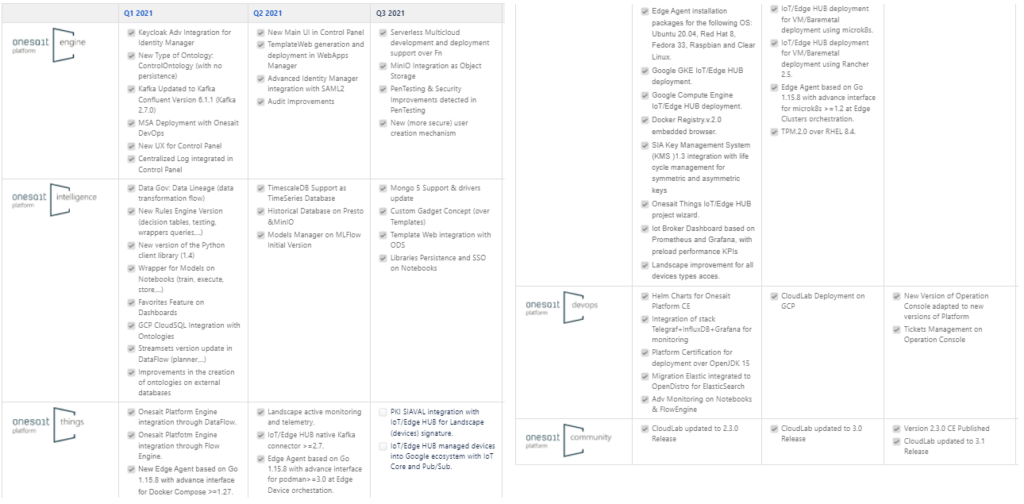
Engine
This distribution of the Platform offers the necessary tools for the agile development of micro services and all kinds of applications through a LowCode approach incorporating a centralized web console that supports the administration, configuration, development and deployment of these applications.
In this version we have incorporated important characteristics:
Versioning of Platform elements over Git
This functionality allows us to have the Platform elements versioned, such as Entities, Dashboards, Gadgets, APIs, etc. in a Git repository, in such a way that we can have a control of changes on these elements and restore a previous version at any time.
In addition, we will be able to generate tagged versions of the elements (tags in Git), so that in case of migration or if we want to restore a specific version of the elements, we can do it without problems.
First, we configure the Git repository associated with our Platform instance:

Next, a snapshot of the Platform resources at that moment is generated:

From then on, every time we create or edit an element, in addition to being saved in the ConfigDB, it will be persisted in the configured Git:

You can find the details of this functionality in this article of the Development Portal.
Traceability of business processes
This feature allows us to monitor the execution of processes, which is very useful if we have processes that are executed periodically and we want to know the status of these processes (to know if the operations have been carried out correctly or if there has been a problem in any of the executions). ). In this first version, operations with Entities (Insert, Update, Delete, etc.) from different sources (IoTBroker, Dataflow, etc.) have been taken into account.
The functionality is accessible in the Data Governance section, and allows you to configure the operations to monitor, how often to monitor them, etc.
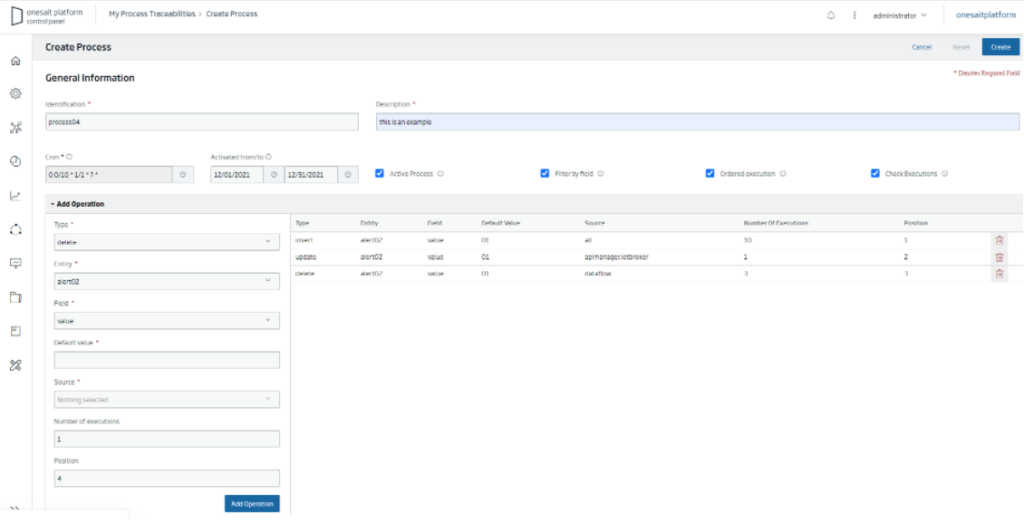
You can find the details of this functionality in this article of the Development Portal.
New UI to view deployed modules
This user interface allows us to check at a glance which Platform modules we have deployed, in addition to the screen also allowing the export of the results to a CSV file.
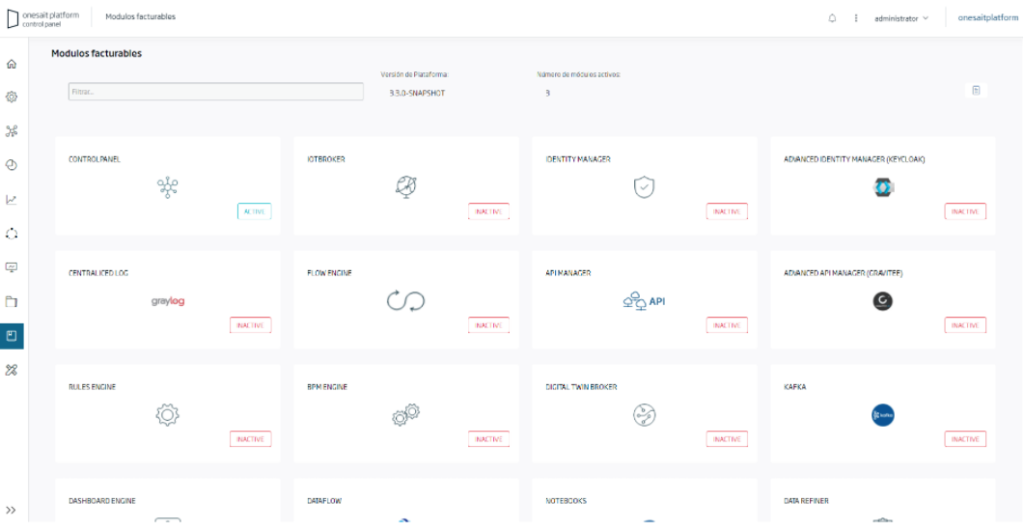
You can find more information in an extended way in this other article.
Improvements and bug fixes
In this version, the bugs identified by Platform users have been resolved, in addition to incorporating numerous improvements such as:
- Centralized management of configuration parameters for passwords (length, complexity, expiration). We tell you about it in more detail in this article.
- Update to the latest version of Keycloak in Identity Manager.
Intelligence
This distribution of the Platform supports the development of systems that use the Intelligence capabilities of the Platform, including ingestion from different sources, analytics, generation and visualization of KPIs and Artificial Intelligence and Machine Learning models.
In this fourth quarter we have worked on:
CRUD Gadget for Entities
This functionality allows you to create Gadgets that offer CRUD functionality (Create, Read, Update and Delete) on an Entity without having to program. The functionality allows you to create, edit, delete and search for items in addition to exporting the list to CSV.

This article describes all the options of the component in detail.
Gadget Import of files on Entities
This new Gadget (implemented as Gadget Template) allows you to import records to an Entity from a file in CSV and JSON format.

We tell you how to use this importer in this article on the Development Portal.
Update UI Dashboards in the Control Panel
Continuing with the redesign of the Control Panel user interface, the Dashboard creation interface has been improved, including a new interface that is more user friendly. This will allow us to add or create Gadgets in the Dashboards in a simpler way, simply by dragging the desired element and dropping it on the Dashboard canvas.

You can find all the information about it in this article.
Form design in Gadgets Templates
We have redefined the way of creating forms for Gadget Templates and it has been decoupled from the code (maintaining compatibility), being able to recover its definition from the Gadget Template itself, which allows forms to be generated in other technologies or with other libraries externally.

You can consult the detail of the functionality in this article.
Other improvements and bug fixes in Dashboards
In this release, improvements have been incorporated in Dashboards functionality, such as:
- Improvements in Dashboards management APIs.
- Events throughout the life cycle of Gadgets.
- API to generate images of a Dashboard.
- Image association to a Gadget and a Dashboard.
- Full screen edition of gadgets for macOS.
Things
In this distribution of the Platform we support the development of IoT systems, both in the Cloud and Edge spheres.
In this quarter we have made progress in:
TPM.2.0 over RHEL
Secure storage of device attestation credentials in TPM.2.0 for encryption of communications and encryption in storage.
DevOps
Within this line of work we include all the tools, utilities and platform capabilities that help in the Development and Operation.
Advanced monitoring of the Platform components
Both Rancher and OpenShift allow deployment monitoring using Prometheus and Grafana. In this version, the deployment of the metrics generated by all the Platform modules with this monitoring system has been completed.
In this way, from the same monitoring tool, the metrics can be consulted not only at the Kubernetes level, but at the level of each module; for example, status of the RAM memory of each process, or more detailed metrics such as, for example, the records processed by each Dataflow, the status of Kafka consumers, the number of operations in the different databases, etc.
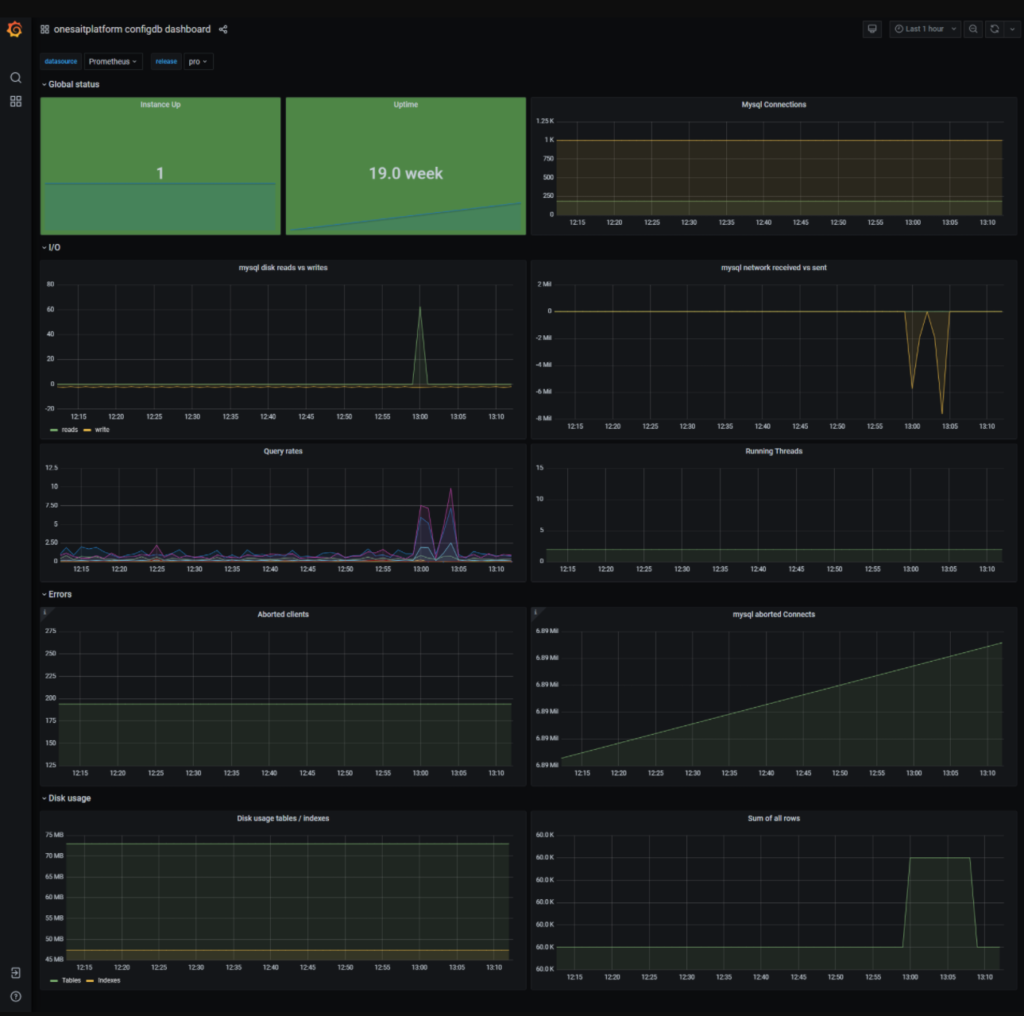
If you are interested in knowing how to enable this monitoring, we will tell you about it in detail in this article on the Development Portal.
Backups of Platform ConfigDB on MinIO
This system, once enabled, periodically launches a backup of the ConfigDB databases and stores it as a zip in MinIO, so that we can always recover a version of the Platform elements:

You can find all the technical information about it in this article.
PostgreSQL certification as ConfigDB
We have certified PostgreSQL as ConfigDB, to give Platform customers even more flexibility, so they can choose whether to use MariaDB or PostgreSQL as their configuration database. This will allow us to optimize infrastructure costs when they already use one of these databases in their repositories.
In this article you can find more information about it.
Update to Rancher 2.6 and Kubernetes 1.21 over container.d
With the increasing use and popularization of containerization technologies, alternatives to Docker have been emerging, even the reference orchestrators, such as Kubernetes or Openshift, have implemented their own Docker-agnostic containers execution runtime.
This is the case of Kubernetes, which from versions higher than 1.20 has deprecated Docker as runtime, allowing you to choose between CRI-O or container.d, both compatible with Docker containers. Both CRI-O and container.d are implementations of CRI (Container Runtime Interface), the latter runtime is also used by Docker, with which compatibility is complete.
That is why other tools that make use of Kubernetes have wanted to mark a milestone along the way coinciding with this change. Like for example Rancher and RKE (Rancher’s Kubernetes runtime) which have given a face lift to version 2.6 of Rancher and a “comprehensive overhaul” to RKE2, making both easier and more intuitive to install and use.
New channel for ticket management
In December 2021, the migration of the ticketing system from the Platform to JIRA Service Desk has been completed. This migration allows us to have greater control over the SLAs of the Platform and to have complete traceability of the issues of the Platform and of the products integrated with JIRA.
Users with an active Platform subscription can open a support ticket from the Portal. In case you don’t have a user, you can create it from a form:
Onesait Platform Community
This line of work includes the tasks we carry out in relation to the Platform Community, of which the Open Source version of Onesait Platform is a part, as well as the different communication channels of the Platform.
During this last quarter of 2021, we worked in:
Community Channels
They are the ones we use to be in contact with you and keep you up to date with our news. We continue to expand little by little through the various channels.
Community Channels: they are the ones we use to be in contact with you, and we continue to grow both in content and in followers (thank you all very much!). Throughout this fourth quarter of the year we have:
- We gained +30 users and added 1,130 users in the CloudLab of the Onesait Platform, our free and experimentation environment.
- We reached 160 subscribers on our YouTube channel, adding +80 hours of viewing and achieving +9,400 impressions during this quarter.
- Our Community version of the Platform adds +75 clones on GitHub, adding a total of +540 clones, and with a total of 255 developers involved in the project.
- Our Blog has a total of +140,000 readings of our articles, increasing this month to +11,000 (thanks to all!).
- We surpassed +15,000 impressions on Twitter, with 60 retweets and 90 likes from our tweets.
If you want to keep up to date with our webcasts, be sure to join our Meetup community, where there are already +720 subscribers.
- Publication of release 3.0.0-ce on GitHub: which you can download and test from our repository.
- Updated CloudLab instance: with version 3.2-Legend.
We hope that you like the new news that we bring and that they are useful for your projects. For any questions or queries that may arise to you, please leave us a comment.

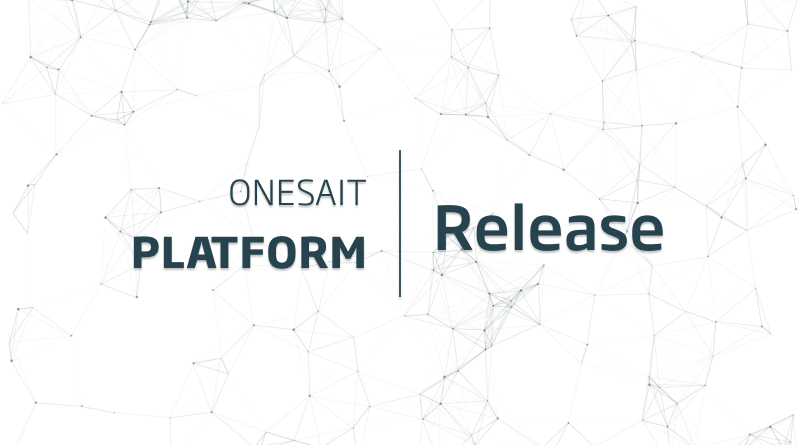
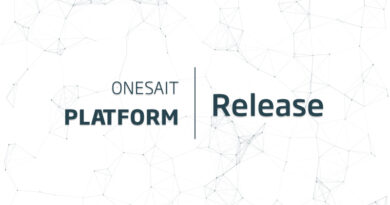

Pingback: Release 4.0.0-Nitroball for Onesait Platform – Onesait Platform Community